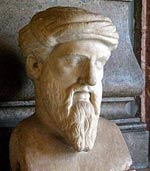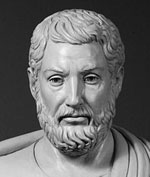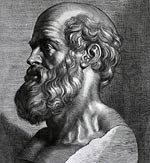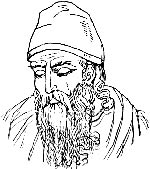Ancient Greece (Hellas) was in many ways the birthplace of Western civilisation. It was Greece that gave the world the idea of democracy, Western philosophy, the Olympics and influential works of Western literature. Situated at the junction of North Africa, Western Europe and Asia, Greek culture and philosophy have played a large role in shaping the development of Western and world history.
Over the years, the boundaries of Greece have shifted, but the country is made up of key regions – Macedonia, Athens, Central Greece, the Peloponnese, Thessaly, Epirus, the Aegean Islands, Thrace, Crete, and the Ionian Islands.
Famous Greeks

 Solon (638 BC – 558 BC) An Athenian statesman and lawmaker. Solon is credited with playing a key role in the development of Athenian democracy. He played a role in developing the Athenian constitution which stated that all citizens could take part in the Athenian assembly – acting as a check on the power of tyrants.
Solon (638 BC – 558 BC) An Athenian statesman and lawmaker. Solon is credited with playing a key role in the development of Athenian democracy. He played a role in developing the Athenian constitution which stated that all citizens could take part in the Athenian assembly – acting as a check on the power of tyrants.
Sappho 
Pythagoras (c. 570 BC – c 495 BC) Greek philosopher, spiritual leader and mathematician. Pythagoras is believed to be one of the first Western men to describe himself as a philosopher – ‘lover of wisdom’ His philosophy was based on the mystical traditions of Egypt and Greece. He is also credited with mathematical theorems.
(c. 570 BC – c 495 BC) Greek philosopher, spiritual leader and mathematician. Pythagoras is believed to be one of the first Western men to describe himself as a philosopher – ‘lover of wisdom’ His philosophy was based on the mystical traditions of Egypt and Greece. He is also credited with mathematical theorems.
 Cleisthenes ( 570 BC – 558 BC ) A noble Athenian who is credited with the creation of the first democracy in Athens in 507 BC. Cleisthenes instigated democratic reform, such as reducing power gained through heredity principles. Cleisthenes stated his laws sought to promote equality an important democratic principle.
Cleisthenes ( 570 BC – 558 BC ) A noble Athenian who is credited with the creation of the first democracy in Athens in 507 BC. Cleisthenes instigated democratic reform, such as reducing power gained through heredity principles. Cleisthenes stated his laws sought to promote equality an important democratic principle.
 Aeschylus (524 BC – c.455 BC) Considered the father of tragedy. He wrote an estimated 70 plays, which depicted both evil and the interaction of characters in the plays. Our knowledge of the tragedy genre begins with Aeschylus.
Aeschylus (524 BC – c.455 BC) Considered the father of tragedy. He wrote an estimated 70 plays, which depicted both evil and the interaction of characters in the plays. Our knowledge of the tragedy genre begins with Aeschylus.
 Sophocles (497 BC – 406 BC) An influential dramatist, Sophocles was a prolific writer of plays, expanding the genre and becoming one of the most popular writers of ancient Greece. His most famous plays included mythical characters, such as Oedipus and Antigone.
Sophocles (497 BC – 406 BC) An influential dramatist, Sophocles was a prolific writer of plays, expanding the genre and becoming one of the most popular writers of ancient Greece. His most famous plays included mythical characters, such as Oedipus and Antigone.
 Pericles (495 – 429 BC) One of the most influential Greek statesman of the Greek Golden Age. He was noted as a great orator. He strengthened the Athenian Empire, fostering the fledgeling Greek democracy. He was also a great supporter of the arts and culture, beginning the project to build the Parthenon.
Pericles (495 – 429 BC) One of the most influential Greek statesman of the Greek Golden Age. He was noted as a great orator. He strengthened the Athenian Empire, fostering the fledgeling Greek democracy. He was also a great supporter of the arts and culture, beginning the project to build the Parthenon.
 Herodotus (c. 484–425 BC) A historian from ancient Greece. Herodotus attempted to write down the oral histories that he heard on his travels. He has been referred to as the ‘father of history’ for his attempt to catalogue historical events.
Herodotus (c. 484–425 BC) A historian from ancient Greece. Herodotus attempted to write down the oral histories that he heard on his travels. He has been referred to as the ‘father of history’ for his attempt to catalogue historical events.
 Euripides c. 480 – 406 BC) One of the three great playwrights, who wrote over 90 tragedies. He expanded the genre, displaying an unusual sympathy for all members of society. His plays became a cornerstone of Western literature and influenced many writers, poets and playwrights.
Euripides c. 480 – 406 BC) One of the three great playwrights, who wrote over 90 tragedies. He expanded the genre, displaying an unusual sympathy for all members of society. His plays became a cornerstone of Western literature and influenced many writers, poets and playwrights.
Socrates (469 – 399 BC) Athenian philosopher, famous for his Socratic method of questioning every preconception. His philosophy was spread by his pupil Plato and recorded in Plato’s Republic. Socrates was put on trial for ‘corrupting the youth’ and, sentenced to death by the court, he voluntarily took hemlock – calmly accepting his fate.
(469 – 399 BC) Athenian philosopher, famous for his Socratic method of questioning every preconception. His philosophy was spread by his pupil Plato and recorded in Plato’s Republic. Socrates was put on trial for ‘corrupting the youth’ and, sentenced to death by the court, he voluntarily took hemlock – calmly accepting his fate.
 Hippocrates 460BC – 377BC) – Hippocrates was a great doctor of ancient Greece. Through his careful examination of patients, treatments and success rates he was able to improve medical practise and treatment. He is also credited with the Hippocratic oath which is still sworn today by medical practitioners.
Hippocrates 460BC – 377BC) – Hippocrates was a great doctor of ancient Greece. Through his careful examination of patients, treatments and success rates he was able to improve medical practise and treatment. He is also credited with the Hippocratic oath which is still sworn today by medical practitioners.
 Aristophanes 446 BCE – c. 386 BCE Poet and comic playwright of ancient Greece. Aristophanes wrote satirical plays, including criticism of Socrates and Cleon a leader of the Athenian polis.
Aristophanes 446 BCE – c. 386 BCE Poet and comic playwright of ancient Greece. Aristophanes wrote satirical plays, including criticism of Socrates and Cleon a leader of the Athenian polis.
Plato (424 – 348 BC) – Greek philosopher. A student of Socrates, Plato founded the Academy in Athens – one of the earliest seats of learning. His writings, such as ‘The Republic’ form a basis of early Western philosophy. He also wrote on religion, politics and mathematics.
(424 – 348 BC) – Greek philosopher. A student of Socrates, Plato founded the Academy in Athens – one of the earliest seats of learning. His writings, such as ‘The Republic’ form a basis of early Western philosophy. He also wrote on religion, politics and mathematics.
 Dionysius I, (c.432-367) Greek tyrant of Syracuse (Sicily) ruler of the Syracusan empire. Dionysius ignored the democratic principles and created a powerful empire for himself.
Dionysius I, (c.432-367) Greek tyrant of Syracuse (Sicily) ruler of the Syracusan empire. Dionysius ignored the democratic principles and created a powerful empire for himself.


 Euclid (c. 325 – 265 BC) Greek mathematician. Euclid is often referred to as the ‘father of modern geometry.’ His book ‘Elements‘ provided the basis of mathematics into the Twentieth Century.
Euclid (c. 325 – 265 BC) Greek mathematician. Euclid is often referred to as the ‘father of modern geometry.’ His book ‘Elements‘ provided the basis of mathematics into the Twentieth Century.
 Archimedes (287 B.C – 212) Mathematician, scientist and inventor. Archimedes made many contributions to mathematics. He explained many scientific principles, such as levers and invented several contraptions, such as the Archimedes screw.
Archimedes (287 B.C – 212) Mathematician, scientist and inventor. Archimedes made many contributions to mathematics. He explained many scientific principles, such as levers and invented several contraptions, such as the Archimedes screw.

Citation: Tejvan Pettinger. “Famous Greeks”, Oxford, UK, biographyonline.net, 14th February 2014.
The Story of the Greeks
The Story of the Greeks at Amazon
Related



 People who shaped democracy – Ancient Greeks such as Cleisthenes and Colon, and modern promoters of democracy – John Locke, William Penn and Rousseau.
People who shaped democracy – Ancient Greeks such as Cleisthenes and Colon, and modern promoters of democracy – John Locke, William Penn and Rousseau.
Related

